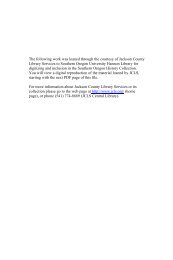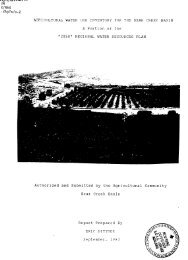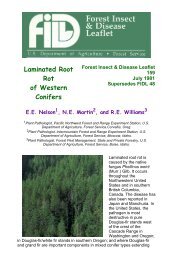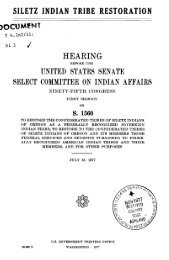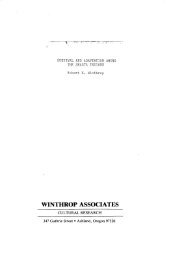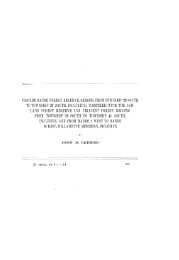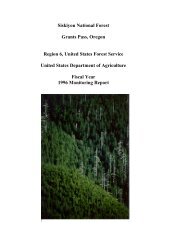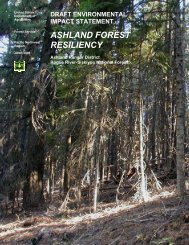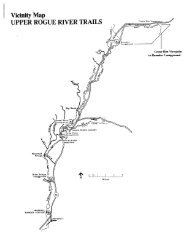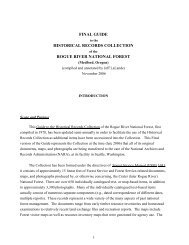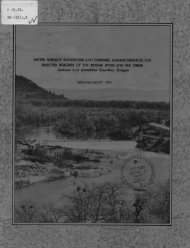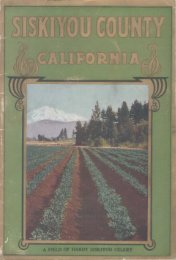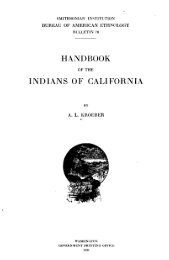- Page 1 and 2: United States Department of Agricul
- Page 3 and 4: This document is printed on recycle
- Page 5 and 6: Ninety-four percent of the response
- Page 7 and 8: Businesses and Organizations ALLA M
- Page 9 and 10: ROBERT AURNAGUE-DESPAIN LEE R. AUST
- Page 11 and 12: C. M. BURDUCK SID BURGDORF KATHERYN
- Page 13 and 14: ROD DAVIS WISBY D. DAVIS JOE DAVISO
- Page 15 and 16: HENRY FREEMAN OLGA A. FREEMAN EDNA
- Page 17 and 18: CHARLES HEATON JIM HEBERLEIN JOE HE
- Page 19 and 20: TOM L. KELLER DONNA KELLER RAYMOND
- Page 21 and 22: TOM MARKLEY JOHN D. MARKS RICHARD H
- Page 23 and 24: E. & W. NEUBERT BILL NEWELL JEANNE
- Page 25 and 26: JOHN R. REYNOLDS JUDY REYNOLDS BILL
- Page 27 and 28: RICHARD A. SMITH CRAIG W. SMITH WAL
- Page 29 and 30: GERALD E. VERMILLION W. HARRY VETHE
- Page 31 and 32: Comments and Responses
- Page 33 and 34: often when conditions are optimum f
- Page 35 and 36: we do not normally conduct prescrib
- Page 37 and 38: The Proposed Land and Resource Mana
- Page 39 and 40: Comment D-19. 15. These standards a
- Page 41: Firewood Comment The demand for dea
- Page 45 and 46: Response Chapter 4 of the FEIS has
- Page 47 and 48: these standards to be applied at th
- Page 49 and 50: Lands Comment To acquire all inhold
- Page 51 and 52: Comment The plan need not be amende
- Page 53 and 54: Comment Page IV-34. Wilderness Mana
- Page 55 and 56: Comment Since the State Highway sys
- Page 57 and 58: Comment Page IV-60 (22) - Facilitie
- Page 59 and 60: Comment Page IV-10 - Effects of the
- Page 61 and 62: While it may be true that some area
- Page 63 and 64: Park. We are concerned about how th
- Page 65 and 66: Mountain Pine Beetle Comment With r
- Page 67 and 68: Comment A final comment with regard
- Page 69 and 70: that .'..Alternatives B and C are t
- Page 71 and 72: Comment Also, I feel that along wit
- Page 73 and 74: Comment The habitat management stan
- Page 75 and 76: Comment The conversion of 74.2 perc
- Page 77 and 78: Comment PP IV40. 8. Disturbance of
- Page 79 and 80: Other Comments Comment I am in favo
- Page 81 and 82: Response Research Natural Areas are
- Page 83 and 84: Response The discussions in chapter
- Page 85 and 86: Pelican Butte Comment The plan shou
- Page 87 and 88: Comment Outside of the three design
- Page 89 and 90: Response The current winter sports
- Page 91 and 92: Because the only reason given in th
- Page 93 and 94:
Response True. Effects will be dete
- Page 95 and 96:
Response Scoping for the Forest Pla
- Page 97 and 98:
Comment The main points we wish to
- Page 99 and 100:
Comment The DEIS does not adequatel
- Page 101 and 102:
Comment The Winema did not perform
- Page 103 and 104:
Comment Webster's Third New Interna
- Page 105 and 106:
worst case analyses are presented.
- Page 107 and 108:
Comment IV-14 Para. 3. (and all oth
- Page 109 and 110:
Comment The proposed monitoring pla
- Page 111 and 112:
may be reluctant to authorize them.
- Page 113 and 114:
Comment A complete assessment of en
- Page 115 and 116:
the the soils, riparian zones, and
- Page 117 and 118:
Comment Studies in Arizona and Cent
- Page 119 and 120:
Response Final Forest Plan recogniz
- Page 121 and 122:
Comment Trout unlimited recommends
- Page 123 and 124:
soil conditions, plant phenology, t
- Page 125 and 126:
Comment The LRMP states that 'The l
- Page 127 and 128:
Recreation Comment I, then, fully u
- Page 129 and 130:
Comment What is the difference betw
- Page 131 and 132:
Response Wildernesses were not only
- Page 133 and 134:
Response The terms 'snowmobile,' wa
- Page 135 and 136:
Crater Lake National Park, Upper Kl
- Page 137 and 138:
Response Agreed. These are some of
- Page 139 and 140:
Response The FEIS preferred alterna
- Page 141 and 142:
Comment We request that the WNF ins
- Page 143 and 144:
Comment The National Forest is supp
- Page 145 and 146:
Comment I also do not see why so mu
- Page 147 and 148:
Comment P.11-51. It should be state
- Page 149 and 150:
Comment Guidelines for visual manag
- Page 151 and 152:
Comment If there was a road into th
- Page 153 and 154:
ment. I believe that a niche market
- Page 155 and 156:
Comment Where possible, the plan sh
- Page 157 and 158:
Roads and Corridors Comment The pro
- Page 159 and 160:
and to reduce road maintenance expe
- Page 161 and 162:
Comment Specifically, there is a ne
- Page 163 and 164:
esponse to public comment, addition
- Page 165 and 166:
Response The number of miles to be
- Page 167 and 168:
KLAMATH COUNTY HISTORICAL LUMBER AN
- Page 169 and 170:
Comment According to Henshaw, the i
- Page 171 and 172:
should be planned as a part of the
- Page 173 and 174:
Comment I have made a continuous st
- Page 175 and 176:
thus tends to have a higher risk of
- Page 177 and 178:
it should be realized by the plan a
- Page 179 and 180:
log and lumber haul which depends o
- Page 181 and 182:
Soils Comment Can Eastern Oregon, t
- Page 183 and 184:
Threatened and Endangered Plants an
- Page 185 and 186:
Response The Area 4 Forests, which
- Page 187 and 188:
Spotted owl - Spotted owl habitat a
- Page 189 and 190:
Response The current status of the
- Page 191 and 192:
Timber Management Comment Has any p
- Page 193 and 194:
Comment I also feel that not enough
- Page 195 and 196:
Response I am sorry if we led you t
- Page 197 and 198:
The harvest levels should be pulled
- Page 199 and 200:
Comment In my opinion, clearcutting
- Page 201 and 202:
Response Yes, this is true; and, fo
- Page 203 and 204:
The Forest definitely looks differe
- Page 205 and 206:
Comment DEIS, 11-84, Table 3A - All
- Page 207 and 208:
Comment People need affordable hous
- Page 209 and 210:
Response The Winema National Forest
- Page 211 and 212:
The citation at the bottom of page
- Page 213 and 214:
were changed to remove logging with
- Page 215 and 216:
trees on an acre with no reductions
- Page 217 and 218:
Response The present Timber Resourc
- Page 219 and 220:
Comment When managing future lodgep
- Page 221 and 222:
to produce a clear block of wood be
- Page 223 and 224:
Response The DEIS was designed so s
- Page 225 and 226:
Response The discussion for the ope
- Page 227 and 228:
Comment We recommend that the Winem
- Page 229 and 230:
Response We did not input the uneve
- Page 231 and 232:
Response The inventory has been upd
- Page 233 and 234:
Response Chapter 4 of the Forest Pl
- Page 235 and 236:
of the plots are still available an
- Page 237 and 238:
There are no mitigating measures to
- Page 239 and 240:
Chapter 4 of the FEIS in Effects of
- Page 241 and 242:
and regenerated often. The mixed co
- Page 243 and 244:
Response Yes, we agree that timber
- Page 245 and 246:
Comment I request that you closely
- Page 247 and 248:
The Winema's Forest Plan will not c
- Page 249 and 250:
Response The FEIS Preferred Alterna
- Page 251 and 252:
Response We elected not to make thi
- Page 253 and 254:
Comment D-80 Timber 1. Change to re
- Page 255 and 256:
acre of uneven-aged management rece
- Page 257 and 258:
Comment Adjustments to yield estima
- Page 259 and 260:
The forest does note that certain c
- Page 261 and 262:
6. Improve the forest's ability to
- Page 263 and 264:
emphasizes timber production over o
- Page 265 and 266:
Comment Mixed Conifer and Lodgepole
- Page 267 and 268:
Water Comment Marsh, which is mostl
- Page 269 and 270:
area values and define water qualit
- Page 271 and 272:
compliance with water quality stand
- Page 273 and 274:
Comment The time frame of 50 years
- Page 275 and 276:
Comment The riparian management are
- Page 277 and 278:
Furthermore, the DEIS (pgs. 111-59-
- Page 279 and 280:
Response There will be no programme
- Page 281 and 282:
Response Class IlIl streams are pro
- Page 283 and 284:
upper limit which would make monito
- Page 285 and 286:
management activities, it does not
- Page 287 and 288:
eceived the priority that it might
- Page 289 and 290:
Response We agree that the fisherie
- Page 291 and 292:
Response Alternative E was the Pref
- Page 293 and 294:
are included. Additional study is n
- Page 295 and 296:
ODFW recommends all pure aspen stan
- Page 297 and 298:
elk habitat. You should include suf
- Page 299 and 300:
Response The Forest Plan provides a
- Page 301 and 302:
Response The Plan will provide spot
- Page 303 and 304:
Response Management Area 9 address
- Page 305 and 306:
Comment No nesting or population su
- Page 307 and 308:
costs. Our analysis indicates that
- Page 309 and 310:
logical reason not to allow elk num
- Page 311 and 312:
Comment From a wildlife perspective
- Page 313 and 314:
Response The description of MA 8 is
- Page 315 and 316:
Response The Forest is attempting t
- Page 317 and 318:
Comment In summary, NFMA requires t
- Page 319 and 320:
Response Recreation demand has been
- Page 321 and 322:
Comment The riparian area managemen
- Page 323 and 324:
old-growth stands located in a five
- Page 325 and 326:
pine sites produce more forage in d
- Page 327 and 328:
Comment P.IV-16 Below-cost Timber S
- Page 329 and 330:
Response See the Glossary for defin
- Page 331 and 332:
Response The goals for Management A
- Page 333 and 334:
Comment Need for Further Documentat
- Page 335 and 336:
different levels of protection woul
- Page 337 and 338:
Comment Threatened and Endangered S



